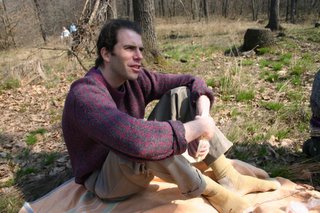Live from Diocletian's Palace
I'm certain I'll feel better in a bit just as soon as I've had a Yoga practice.
The palace is reminds me a bit of Essaouira, Morocco. Much of Essouira is contained in a walled "medina" that faces the ocean and dates back some 500 years. This place dates back a lot further, but it has many of the same features: very narrow streets, paved with cobblestones, low ceilings, cool interiors despite a sweltering exterior. dark tunnels connecting different little plazas. Like Essaouira, little shops peer out from the stone walls of the narrow streets. Many of these shops are essentially the same: snack bars, bakeries, cafes, internet halls, clothing stores, galleries. Unlike Essaouira, there are no artisans' shops where young craftspeople produce wooden sculptures and furniture, ceramic objects of art, paining and musical instruments, especially drums. Instead, the young folk of Diocletian's Palace seem to idle around the shops and cafes, smoking cigarettes, drinking coffee and so forth. The galleries themselves all seem to double as cafes and are filled with the pungent blue haze of cigarette smoke. Their idleness is depressing, compared to the air of self-possession and industry exhibited by many young Essaouirans. I suspect it would improve things greatly and attract a higher class of tourist if music and arts & crafts were installed as a practice here in a manner similar to what I saw in Essaoiura. Now, what you see sold at the tourist shops are the dull trinkets, wooden chess sets, pocket knices and ashtrays you see at tourist sites the world round. If this could be changed, following the Essaouira model, the merchandise offerings would improve and the place would become decidedly more hip. A sense of community would also take hold once you got enough artists, craftspeople and musicians in place.
One could start by researching the local crafts customs of Croatia and bring in masters to teach their crafts to young people. And if no musical instrument makers are available, then import them. You would have no problem finding young apprentices.
Outside the palace, Split further resembles Essaouira with the presence of a fish market as well as a farmer's market. The farmer's market has a fantastic selection of fresh local fruits and vegetables from melon to apricot to zuccini to spinach to cherry to strawberry. The quality compares favorably to Budapest's organic market. I'm told the locals don't use artificial aids like fertilisers and pesticides. The apples taste decidedly organic, lacking the thick skins and tartness that characterise the non-organic variety.
Further out, one sees a flat, parched area populated by modern, often half-finished constructions - homes and businesses - scattered fat palm trees and mountains in the distant. A lot like Morocco. Minus the hash.

